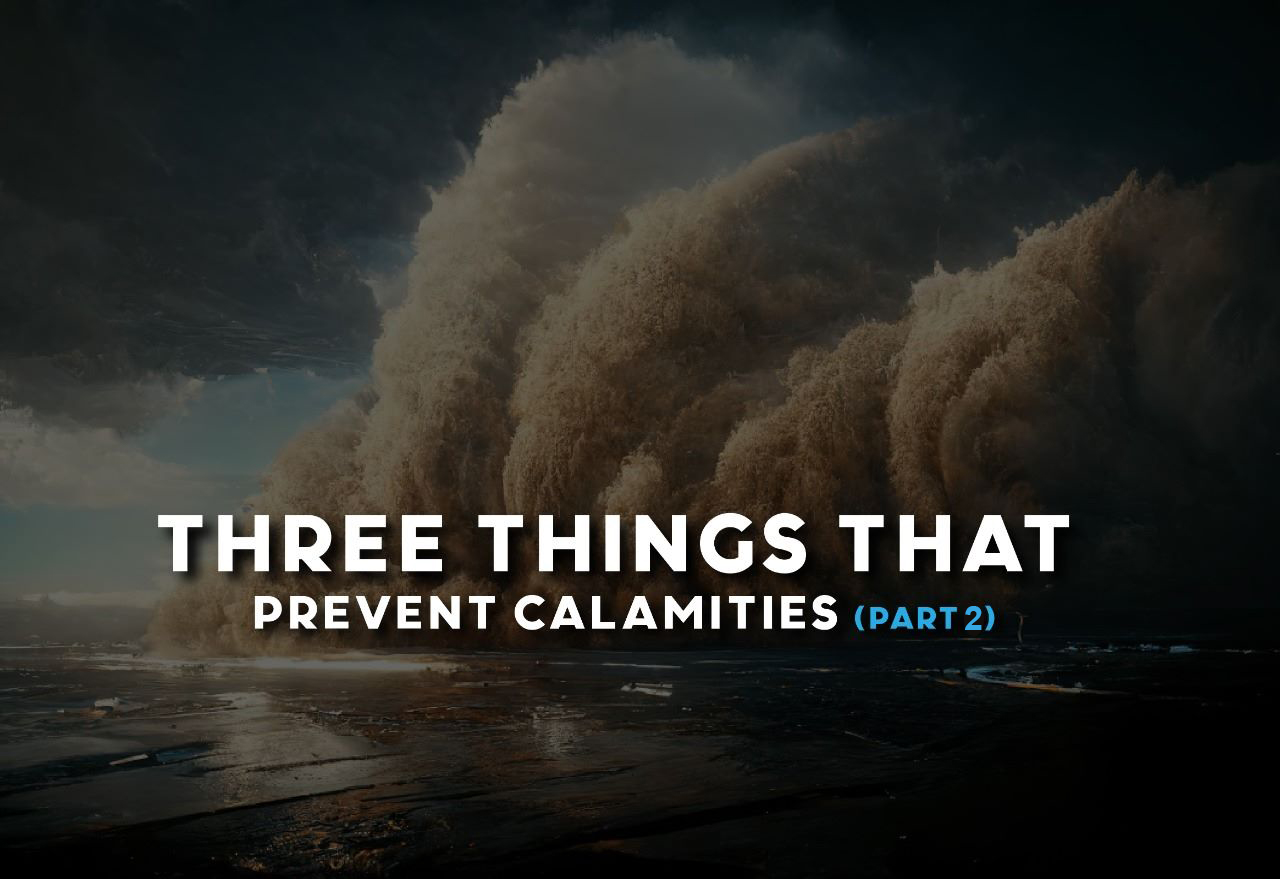This is a continuation of the article:
Three Things that Prevent Calamities (Part 1)
Three Things that Prevent Calamities (Part 3)
In this article the author is talking about ways to prevent calamities, Du’a being the first one.
2. Welfare Services
Another way to prevent misfortune is through charity. Serving humanity prevents suffering and troubles from impacting you.
The Prophet ﷺ said:
“Good deeds guard against evil, Charity in secret extinguishes the Lord’s anger, maintaining ties of kinship prolongs life, every good is charity, and the people of correctness in this world are the people of correctness in the Next World. The people of the incorrect in this world are the people of the incorrect in the Next World.”
(Sahih al-Jami’ 3796)
The Importance of Providing Welfare Services
In Islam, the best person is the one who is more beneficial to people along with being pious. Consider the importance of prayer; it has been described as the pillar of religion and the Prophet ﷺ has referred to it as the “cooling of his eyes.” It has been said in a hadith that just as entering Islam erases past sins, similarly, Hajj Mabrur (an acceptable Hajj) also erases past sins. However, what is the example of a better person? The Prophet ﷺ did not say that the one who prays the most, the one who fasts the most, or the one who performs Hajj and sacrifices the most is the better person, rather the Messenger of Allah ﷺ said:
“The most beloved people to Allah (عَزَّوَجَلَّ) are those who are most beneficial to people. The most beloved deed to Allah (عَزَّوَجَلَّ) is to make a Muslim happy, to remove one of his troubles, to settle his debt, or to repel hunger from him. For me to walk with a brother in order to assist him is more beloved to me than to make Itikaf (seclude myself) in Masjid an-Nabawi for a month. Whoever swallows his anger, then Allah (عَزَّوَجَلَّ) will conceal his faults. Whoever suppresses his rage, even though he could fulfill his anger if he wished, then Allah (عَزَّوَجَلَّ) will secure his heart on the Day of Resurrection. Whoever walks with his brother regarding a need until he secures it for him, then Allah Almighty will make his footing firm across the bridge on the day when the footings are shaken.”
(As-Silsila as-sahiha: 903, Al-Targheeb wa’l-Tarheeb: 2623)
Islam prioritizes and emphasizes the importance of human and social service, as its benefits are great. That is why the Holy Qur’an declares this Ummah as “the best Ummah ever raised for mankind.” The reason for this is that this Ummah was created not only for its own benefit but for the benefit of humanity and commanded to enjoin what is right and forbid what is wrong.
The Prophet Muhammad’s (ﷺ) Approach to Welfare Services
We have the practical example of the Prophet ﷺ regarding welfare works and human services. He was always actively engaged in humanitarian efforts. Even before his prophethood, he was known for helping the poor. Khadija (رَضِيَ ٱللَّٰهُ عَنْھَا) described the Prophet ﷺ in these golden and comprehensive words:
“Never! By Allah, Allah will never disgrace you. You keep good relations with your kith and kin, help the poor and the destitute, serve your guests generously and assist the deserving calamity-afflicted ones.
(Sahih al-Bukhari 3)
Islamic Teachings on Welfare Services: Examples from the Actions and Sayings of the Prophet Muhammad (ﷺ)
The Provision of Clean Drinking Water and Digging of Wells
Islam has made many actions a source of happiness, salvation, and forgiveness for mankind, one of which is “providing drinking water.” How great is the reward for giving water to a thirsty person? Just look at the Hadith of the Prophet ﷺ.
Sa’d bin ‘Ubadah asked the Messenger of Allahﷺ:
“What kind of charity is best?” He said: “Providing drinking water.”
(Sunan an-Nasa’i 3666)
In another hadith we learn:
Sa’d ibn Ubadah narrates that he asked the Messenger of Allahﷺ:
“Umm Sa’d has died; what form of sadaqah is best? He replied: Water (is best). He dug a well and said: It is for Umm Sa’d.”
(Sunan Abi Dawud 1681)
The Healing Power of Water
You’d be surprised to hear that giving water to someone is a practice that cures a person’s spiritual as well as physical ailments. Ali ibn Hasan bin Shafiq (may Allah (عَزَّوَجَلَّ) have mercy upon him) narrates that:
“A man asked Imam Abdullah bin Mubarak (may Allah have mercy upon him) about his knee, which had been injured for seven years and was bleeding, the man said: “I consulted many doctors and therapists, but nothing helped.” Imam Mubarak (may Allah (عَزَّوَجَلَّ) have mercy upon him) replied: “Dig a well in a place where people need water, I hope that when the water gushes out there, your blood will stop.” So this person followed Imam Mubarak’s advice and did the same, so he was cured.”
(Siyar A’lam al-Nubala: 8/408)
Imam Qurtubi (may Allah (عَزَّوَجَلَّ) have mercy upon him) narrates concerning some Tabi’in in his tafsir:
“Whoever has more sins should give water to people. Allah Almighty forgave the person who gave water to a dog! So why will Allah not forgive the person who gives life to a single believer by giving water to him?”
(Tafsir al-Qurtubi: 7/215 – Surah Al-A’raf Verse 50)
The Spiritual Significance of Providing Drinking Water
Narrated Abu Huraira (رَضِيَ ٱللَّٰهُ عَنْهُ):
Allah’s Messenger (ﷺ) said, “A prostitute was forgiven by Allah, because, passing by a panting dog near a well and seeing that the dog was about to die of thirst, she took off her shoe, and tying it with her head-cover she drew out some water for it. So, Allah forgave her because of that.”
(Sahih al-Bukhari 3321)
Easing the Suffering of Others
Abu Huraira reported Allah’s Messenger (ﷺ) as saying:
“He who alleviates the suffering of a brother out of the sufferings of the world, Allah would alleviate his suffering from the sufferings of the Day of Resurrection, and he who finds relief for one who is hard-pressed, Allah would make things easy for him in the Hereafter. Allah is at the back of a servant so long as the servant is at the back of his brother.”
(Sahih Muslim 2699)
Caring for the Poor and Needy
The life of the Prophet ﷺ was a complete mercy for the poor and needy. Seeing the pain of the poor, he used to alleviate their pain and sorrow. He ﷺ declared the relief of the sufferings of the poor as a social duty. Therefore, emphasizing the importance of social welfare, he ﷺ said:
“The one who looks after a widow or a poor person is like a Mujahid (warrior) who fights for Allah’s Cause, or like him who performs prayers all the night and fasts all the day.”
(Sahih al-Bukhari 5353)
Feeding the Hungry
Islam with following Allah (عَزَّوَجَلَّ) and the Messenger ﷺ emphasizes serving and helping others, as well as showing empathy and compassion towards them.
Narrated Abu Musa Al-Ash`ari that the Prophet (ﷺ) said:
“Feed the hungry, visit the sick, and set free the captives.”
(Sahih al-Bukhari 5649)
The Prophetﷺ has encouraged his Ummah to feed the poor and needy, relatives and the deserving:
A man asked the Prophet (ﷺ), “What sort of deeds or (what qualities of) Islam are good?” The Prophet (ﷺ) replied, ‘To feed (the poor) and greet those whom you know and those whom you do not know.
(Sahih al-Bukhari 12)
‘Abdullah bin ‘Amr bin Al-‘as (May Allah be pleased with them) reported that the Prophet ﷺ said:
“Whoever feeds his brother until he satisfies him, and gives him water to drink until he quenches his thirst, Allah (عَزَّوَجَلَّ) will keep him away from Hellfire by seven trenches, the distance between two trenches is a distance of five hundred years.”
(Al-Mustadrak ala al-Sahihayn: 7368)
Vocational Education and Empowerment
Islam is a complete code of life that provides perfect guidance in every aspect of life. The Prophet ﷺ discouraged asking for alms. He believed that adopting a despised profession is better than asking for alms. Islam teaches that a laborer should be paid their wages before their sweat dries up. If someone in society wants to learn a skill and gain employment, or if someone already knows a skill but is not confident in it, then helping and guiding such a person is a good act and charity. Narrated by Abu Dhar (رَضِيَ ٱللَّٰهُ عَنْهُ):
I asked the Prophet, “What is the best deed?” He replied, “To believe in Allah and to fight for His Cause.” I then asked, “What is the best kind of manumission (of slaves)?” He replied, “The manumission of the most expensive slave and the most beloved by his master.” I said, “If I cannot afford to do that?” He said, “Help the weak or do good for a person who cannot work for himself.” I said, “If I cannot do that?” He said, “Refrain from harming others for this will be regarded as a charitable deed for your own good.”
(Sahih al-Bukhari 2518)
Supporting Widows
The Prophet ﷺ taught the importance of treating widows kindly and compassionately. Before the advent of Islam, when a woman became a widow, the relatives of the deceased would take possession of her as an inheritance, and her remaining life would be no better than that of a servant. The relatives of the deceased would not only deprive her of inheritance but also make it impossible for her to live. Islam granted widows the right to lead a good life and arranged for their honor and respect in society. Arabs did not like marrying widows, and because of this, the widows would suffer from economic and social insecurity. The Prophet ﷺ put an end to this bad custom by marrying widows himself. The Prophet ﷺ gave widows an honorable position in society and described the virtue of paying their rights as follows:
Facilitating Marriages
In Islam, marriage is considered the foundation of a Muslim family. It is a sacred social contract that has been given sanctity as a form of worship. The Prophet Muhammad (ﷺ) arranged marriages for many men, women, and widows and encouraged the practice through his teachings. He also emphasized the importance of marriage through his teachings, as narrated by Abu Hurairah (رَضِيَ ٱللَّٰهُ عَنْهُ):
The Messenger of Allah (ﷺ) said: “There are three for whom it is a right upon Allah to help him: The Mujahid in the cause of Allah, the Mukatab who intends to fulfill (the Kitabah), and the one getting married who intends chastity.”
(Jami` at-Tirmidhi 1655)
Helping Orphans
The Prophet Muhammad (ﷺ) also established the rights of orphans and other marginalized groups in society, ensuring that they were able to progress in all aspects of life without facing social or economic obstacles. The Prophet (ﷺ) emphasized the virtue of caring for an orphan, saying:
“I and the sponsor of an orphan shall be in Paradise like these two.” And he indicated with his fingers, meaning his index and his middle finger.
(Jami` at-Tirmidhi 1918)
Supporting Those Who Serve Religion and Nation
Assisting and supporting those members of the Islamic society who are engaged in the collective duty of spreading and promoting Islam, protecting and providing for the families of these individuals, and helping them in times of need, is considered a source of great reward in Islam. The Prophet Muhammad (ﷺ) had a special compassion for the families of martyrs and warriors of Islam. The Prophet (ﷺ) said:
“He who prepares a Ghazi going in Allah’s Cause is given a reward equal to that of) a Ghazi; and he who looks after properly the dependents of a Ghazi going in Allah’s Cause is (given a reward equal to that of) Ghazi.”
(Sahih al-Bukhari 2843)
Building Masajid (mosques)
Masajid are built for the worship of Allah (عَزَّوَجَلَّ), and their construction is intended to directly contribute to this worship. However, during the early period of Islam, mosques also served as educational, social, and political centers for Muslims. Their function has changed a lot now and now they are primarily associated with welfare services. Uthman ibn Affan (رَضِيَ ٱللَّٰهُ عَنْهُ) narrates that the Prophet Muhammad (ﷺ) said:
“Whoever built a masjid, intending Allah’s Pleasure, Allah would build for him a similar place in Paradise.
(Sahih al-Bukhari 450)
This hadith highlights the great reward of building a masjid. Mosques serve as important welfare institutions, where decisions about worship and the affairs of Muslims are made. Whenever the Prophet Muhammad (ﷺ) would return from a journey, he would first visit the mosque, meet with the people, inquire about their conditions, and make decisions. Masajid should be centers of education everywhere. Upon closer examination, it becomes clear that the Suffah in the Prophet’s Mosque was an institution where the poor were provided with financial support in the form of food and clothing. It is also noteworthy that in Western countries, Masajid serve as community centers, where activities such as worship, education, and marriage are conducted.
Providing Lodging and Accommodation
Construction of hotels and guesthouses for travelers is also considered a form of welfare service in Islam, as it provides individuals with better accommodations and eases difficulties caused by being away from home. Abu Hurairah (رَضِيَ ٱللَّٰهُ عَنْهُ) narrates that the Prophet Muhammad (ﷺ) said:
“The rewards of the good deeds that will reach a believer after his death are: Knowledge which he taught and spread; a righteous son whom he leaves behind; a copy of the Qur’an that he leaves as a legacy; a mosque that he built; a house that he built for wayfarers; a canal that he dug; or charity that he gave during his lifetime when he was in good health. These deeds will reach him after his death.'”
(Sunan Ibn Majah 242)
This hadith mentions specific acts of welfare referred to as “unending charity,” one of which is the construction of lodging houses and inns for travelers. Another hadith of the Prophet Muhammad (ﷺ) states:
“When a man dies, his acts come to an end, but three, recurring charity or knowledge (by which people) benefit, or a pious son, who prays for him (for the deceased).”
(Sahih Muslim 1631)
Removing Obstacles and Making Paths Safe
Islam places the responsibility of providing welfare services on the people of the state and encourages them to maintain cleanliness and remove obstacles from the paths. It is narrated by Abu Huraira (رَضِيَ ٱللَّٰهُ عَنْهُ) that the Prophet Muhammad (ﷺ) said:
“Faith has over seventy branches or over sixty branches, the most excellent of which is the declaration that there is no god but Allah, and the humblest of which is the removal of what is injurious from the path: and modesty is the branch of faith.”
(Sahih Muslim 35)
Narrated Abu Sa`id Al-Khudri:
The Prophet (ﷺ) said, “Beware! Avoid sitting on the roads (ways).” The people said, “There is no way out of it as these are our sitting places where we have talks.” The Prophet (ﷺ) said, “If you must sit there, then observe the rights of the way.” They asked, “What are the rights of the way?” He said, “They are the lowering of your gazes (on seeing what is illegal to look at), refraining from harming people, returning greetings, advocating good and forbidding evil.”
(Sahih al-Bukhari 2465)
Cooperating with Non-Muslims for the Benefit of Humanity
Islam does not prohibit cooperation with non-Muslim organizations and institutions for the benefit of humanity. The Quran states this principle:
وَتَعَاوَنُواْ عَلَی الْبِرِّ وَالتَّقْوٰی وَلاَ تَعَاوَنُواْ عَلَی الاِثْمِ وَالْعُدْوَانِ وَاتَّقُواْ اللّهَ اِنَّ اللّهَ شَدِیْدُ الْعِقَابِ
“And cooperate in righteousness and piety, but do not cooperate in sin and aggression. And fear Allah; indeed, Allah is severe in penalty.”
[Al-Ma’ida: 2]
Bringing Happiness to Muslims
A Muslim’s life does not only revolve around themselves, but they also strive to alleviate the pain and suffering of others. They find solutions and ways to ease the problems of their Muslim brothers. Allah (عَزَّوَجَلَّ) is pleased with those who share and ease the sorrows of others. One of the great virtues of a person is to bring happiness to others, especially those suffering from grief, trauma, or accidents. There are several traditions on this topic. Narrated by Abu Hurairah:
“A man said ‘O Messenger of Allah! Which deed is the most virtuous?’ He said: ‘The best actions are to cheer up your believing brother, to relieve him of a debt or to feed him.’ “
(Sahih al-Jami’ 1096)
Wishing Well for All Muslims
One of the unique characteristics of Islam is that it trains its followers to have consistency between their inner and outer selves, their speech, and their actions. It teaches them to align their hearts and tongues, eliminating any form of hypocrisy or deception. It is narrated by Tamim ad-Dari that the Prophet Muhammad (ﷺ) said:
“The Religion is sincerity.” We said, “To whom?” He said, “To Allah, to His Book, To His Messenger, and to the leaders of the Muslims and their masses.”
(Sahih Muslim 55)
As Muslims, the exemplary life of the Prophet ﷺ serves as a shining beacon, illuminating the path towards prioritizing and actively participating in social and welfare works. By emulating the good deeds of our beloved Prophet ﷺ, we should actively participate in social and welfare works. As the Ummah of the Holy Prophet ﷺ, it is incumbent upon us to work tirelessly for the betterment of humanity, social welfare, and selfless service to the people without discrimination of any particular group, color, race, or language.











